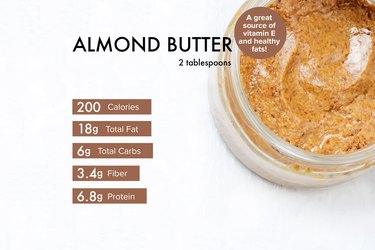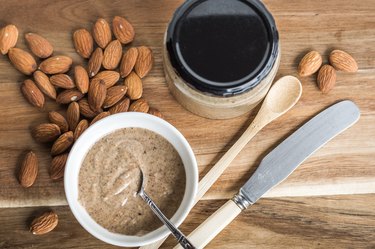
Wonderfully rich and delicious, almond butter is made from ground almond nuts, which are technically the seed of the fruit from an almond tree, according to the Almond Board of California. These trees are closely related to peach, apricot and cherry trees, and the almonds are the pits found within the fruit.
Packed full of nutrients with a naturally buttery flavor, you may have seen an increase in the variety of almond butter at the local grocery store in recent years.
Video of the Day
Video of the Day
Almond Butter Nutrition Facts
Two tablespoons of almond butter is equal to a single serving. Two tablespoons of almond butter contain:
- Calories: 200
- Total fat: 18 g
- Cholesterol: 0 mg
- Sodium: 2.3 mg
- Total carbs: 6 g
- Dietary fiber: 3.4 g
- Sugar: 1.4 g
- Added sugar: 0 g
- Protein: 6.8 g
Almond Butter Macros
- Total fat: One tablespoon of almond butter has 18 grams of total fat, which includes 4.4 grams of polyunsaturated fat, 10.5 grams of monounsaturated fat, 1.4 grams of saturated fat and 0 grams of trans fat.
- Carbohydrates: One tablespoon of almond butter has 6 grams of carbohydrates, which includes 3.4 grams of fiber and 1.4 grams of natural sugar.
- Protein: One tablespoon of almond butter has 6.8 grams of protein.
Vitamins, Minerals and Other Micronutrients
- Vitamin E: 53% of your Daily Value (DV)
- Copper: 34% DV
- Manganese: 30% DV
- Riboflavin (vitamin B2): 24% DV
- Magnesium: 22% DV
- Phosphorous: 13% DV
- Zinc: 10% DV
- Two tablespoons of almond butter is not a good source of iron (6% DV), folate (4% DV), vitamin A (0% DV), vitamin C (0% DV), vitamin D (0% DV), calcium (9% DV) and potassium (5% DV).
The Health Benefits of Almond Butter
Because it's high in fat, many wonder if almond butter is healthy. The short answer: Yes, almond butter is good for you. Like many nuts and nut butters, almond butter has a rich and varied nutrient profile with a wide range of vitamins, minerals and other nutrients.
1. Almond Butter Is Linked to Good Heart Health
Heart disease continues to be a leading cause of death in the United States. Many of us have heard that we should decrease our "bad cholesterol" (known as LDL cholesterol) and increase our "good cholesterol" (aka HDL cholesterol) — and research supports that almonds can help do both!
An article published in the January 2015 issue of the Journal of the American Heart Association found that eating 1.5 ounces of almonds every day might help decrease LDL cholesterol levels while maintaining HDL cholesterol levels.
While the goal is to reduce bad LDL cholesterol, sometimes interventions inadvertently also decrease the helpful HDL. Case in point: Almonds were observed to significantly increase HDL cholesterol levels in people with coronary artery disease within six weeks, according to an April 2018 review of almonds and heart health published in Nutrients.
Almonds are also an excellent source of vitamin E, which is an antioxidant that can help prevent the oxidation of LDL cholesterol in our bodies, thereby helping to decrease our risk of heart disease.
What's more, people who get high amounts of vitamin E were observed to have lower rates of chronic diseases, including heart disease, a September 2015 study in the Korean Journal of Internal Medicine found.
2. It Can Help You Feel Fuller and Support Weight Loss
Almond butter is high in protein, dietary fiber and unsaturated fat, which is an excellent combination to help you feel satiated and reduce hunger between meals. Almonds have the highest protein and fiber content among all tree nuts, which can help curb your appetite.
Eating almonds with meals or snacks resulted in lower levels of hunger, according to a study published in the November 2013 issue of the European Journal of Clinical Nutrition. A January 2015 clinical trial in the Journal of the American Heart Association found that substituting high-carb snacks for almonds reduces belly fat and cholesterol levels.
What's more, noshing on almonds can help suppress hunger, the desire to eat and increase perceived levels of fullness without contributing to weight gain, per a June 2014 study in the American Journal of Clinical Nutrition.
3. Almond Butter Can Help Control Blood Sugar
Eating almonds can help control blood sugar levels and insulin sensitivity, which are important factors for people with diabetes and pre-diabetes.
A study published in October 2019 in Applied Physiology, Nutrition, and Metabolism found that almonds as part of a meal kept blood sugar and insulin levels lower, protecting against spikes. And a March 2017 study in Metabolic Syndrome and Related Disorders found that almonds improve glycemic control and blood lipids in just six months in people with type 2 diabetes.
Avoiding elevated blood sugar levels can be helpful to everyone — not just those with diabetes. A study following college-aged students showed that almonds can help improve glucose tolerance after a meal, according to July 2018 research in Nutrients.
The high dietary fiber, protein and unsaturated fat content likely plays a role in helping control blood sugar, according to the November 2013 European Journal of Clinical Nutrition study.
4. It's Great for Your Skin
Two tablespoons of almond butter give you 53 percent of the daily recommended intake of vitamin E, which benefits your skin in several ways.
This fat-soluble vitamin protects your skin from free radicals and UV radiation, scavenges oxidative stress and promotes wound healing, per a 2016 report in the Indian Dermatology Online Journal. It may also help relieve the symptoms of psoriasis, atopic dermatitis, yellow nail syndrome and other common skin disorders.
Almond Butter Health Risks
Food Allergies
There can be significant safety issues associated with nut and seed consumption and nuts are among the foods more commonly associated with allergic reactions.
Allergies to tree nuts (such as almonds) tend to be severe in nature, causing life-threatening and sometimes fatal reactions. According to the University of Manchester, these allergies are triggered by the proteins found in nuts.
Depending on which proteins someone is allergic to, the reactions may range from a slight oral allergy syndrome, such as an itchy tongue and mouth, to severe and systemic reactions, such as hives, asthma, swelling in the throat or anaphylactic shock.
As a result, the presence of almonds or other tree nuts must be indicated on all food labels.
Warning
If you have a tree nut allergy, avoid almonds, almond butter and other almond products at all costs and remember to read labels to make sure your food was manufactured in a tree-nut-free facility to avoid cross-contamination.
Drug Interactions
There are no known indications of interactions between almond butter and medications.
Best Almond Butter Brands
We recommend buying a jar that contains one ingredient: almonds. Here a few brands we love:
- 365 Everyday Value Creamy Almond Butter ($10.99 per jar on Amazon.com)
- Barney Almond Butter, Bare Smooth ($12.09 per jar on Amazon.com)
- Once Again Organic Crunchy Almond Butter ($35.84 per jar on Amazon.com)
Almond Butter Preparation and Useful Tips

Almond butter is a pantry staple that can be found at the grocery store year-round. Follow these storage tips to keep your almond butter fresh:
- Unopened
almond butter should be stored in a cool, dry place away from exposure and
light, like your cabinet or pantry, at room temperature.
- Once
opened, store almond butter in the refrigerator to prolong freshness and protect it from rancidity.
- If your almond butter is free of additives, it will likely have a layer of oil on the top. When you open your almond butter for the first time, take a spoon or butter knife and thoroughly mix the oil on the top with the rest of the almond butter solids before you refrigerate the jar. This will ensure your almond butter is smooth and creamy to the last drop.
How to Make Almond Butter at Home
- Place 3 cups of raw almonds on a sheet pan and toast in a 350-degree-Fahrenheit oven for approximately 8 to 10 minutes.
- Transfer to a food processor or high-power blender and process until almonds become smooth and resemble a typical nut butter texture. You can process the almonds to whatever level of crunchy or creamy texture you prefer.
- Add a pinch of salt and any other flavors you like. I recommend cinnamon, nutmeg, vanilla and/or a touch of honey.
- Blend once more to incorporate.
- Store in an airtight jar or container in the refrigerator for up to two weeks.
Now that you have your almond butter, here are some quick serving ideas:
- Add to smoothies, oatmeal or yogurt.
- Mix with puffed rice cereal, dried fruit and chopped nuts to make protein bites.
- Add to toast, waffles or pancakes then top with chopped fruit.
- Make a dipping sauce or dressing: Whisk with water, oil, vinegar, salt, pepper and other spices and serve with vegetables or whole grains.
- Make homemade almond butter cups: Add 1 tablespoon melted chocolate in mini muffin cups, place in freezer for 15 minutes, add 1 tablespoon almond butter and top with more melted chocolate, then place in the freezer again for at least 15 minutes.
Almond Butter Recipes
Alternatives to Almond Butter
There are a wide variety of nut and seed butters available on the market today. You can try cashew butter, sunflower seed butter, walnut butter, pistachio butter and pumpkin seed butter.
If you have an allergy to tree nuts, sunflower butter may be your best alternative.
- Almond Board of California: "The Almond Lifecycle"
- My Food Data: "Almond Butter"
- Journal of the American Heart Association: "Effects of Daily Almond Consumption on Cardiometabolic Risk and Abdominal Adiposity in Healthy Adults With Elevated LDL‐Cholesterol: A Randomized Controlled Trial"
- Nutrients: "Almonds and Cardiovascular Health: A Review"
- Korean Journal of Internal Medicine: "Evidence for beneficial effects of vitamin E"
- European Journal of Clinical Nutrition: "Appetitive, dietary and health effects of almonds consumed with meals or as snacks: a randomized, controlled trial"
- American Journal of Clinical Nutrition: "A review of the effects of nuts on appetite, food intake, metabolism, and body weight"
- Applied Physiology, Nutrition, and Metabolism: "Acute effects of an isocaloric macronutrient-matched breakfast meal containing almonds on glycemic, hormonal and appetite responses in men with type 2 diabetes: a randomized cross-over study"
- Nutrients: "Glucoregulatory and Cardiometabolic Profiles of Almond vs. Cracker Snacking for 8 Weeks in Young Adults: A Randomized Controlled Trial"
- University of Manchester: "Allergy information for: Almond (Prunus dulcis)"